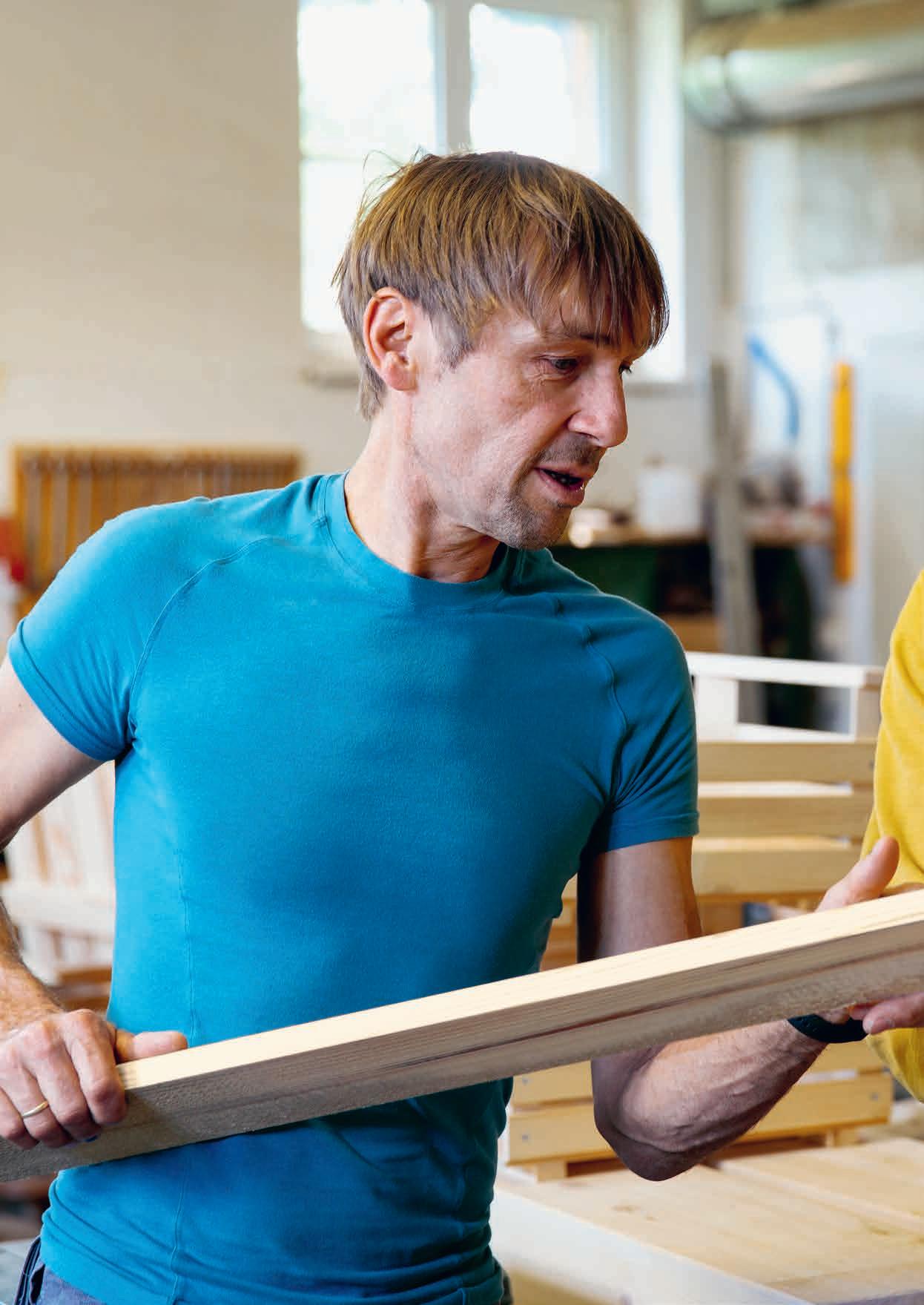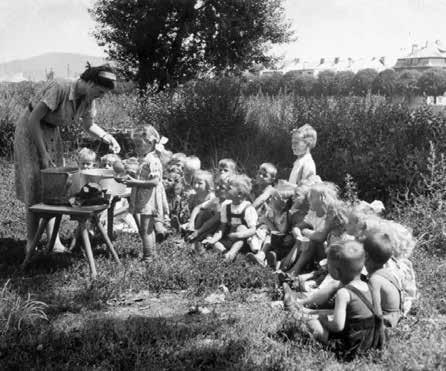
7 minute read
People with Disabilities
100 years of Caritas
Photo: Caritas Photo: Caritas Salzburg Archiv
Advertisement

Key Event in 100 Years of Helping
1921: The Village of St. Anton
The Caritas Village St. Anton was founded in 1921 by the then director of Caritas Salzburg, Franz Fiala. Back in those days, it was already important to Fiala to better integrate children with disabilities into society instead of ignoring, excluding, or neglecting them. Still today, its focus remains on enabling the residents of the village to lead a life of dignity and self-determination to the best of their ability. The village for children has long since become a village for people of all ages. It is exemplary for the many different service offers by Caritas directed at people with disabilities – for 100 years now.
Every person is different
Inclusion. All people are members of society. Every person is of equal value. All people treat each other with respect and as equals. All people have rights and duties. That is inclusion.

The term inclusion seems abstract, intangible, or even utopian to many people. In a society of equal rights, though, inclusion is far too important to remain no more than a theoretical construct.
Therefore, Caritas takes action through its daily structures, residential facilities, projects, and advocacy initiatives to ensure that the participation of all people in Austria becomes a reality. Our aim is to achieve a barrier-free society for persons with disabilities, where everybody has equal opportunities to make use of their abilities to lead a self-determined and fulfilling life. This can only be achieved by eliminating all access barriers to education, the labor market, infrastructure, and to participation in society. Caritas consistently draws the attention of the federal government to existing obstacles and calls for these to be removed and none to be newly created.
A top priority for Caritas is to ensure self-determination for persons with disabilities. Making self-determined decisions requires, among other things, barrier-free access to information, which once again proved more than evident in the second year of COVID-19 pandemic. In 2021, people repeatedly had to face lockdowns, keep up with new regulations, and understand restrictions and information on protective measures as well as COVID-19 vaccinations while making informed decisions. Circumstances such as isolation, lack of access to services coupled with the associated uncertainty for a long time also caused psychological or psychosocial challenges to intensify or emerge for a large number of affected people in 2021. While the impact of these experiences was particularly evident in the working environment of people with disabilities, other areas reflected an increase in accompanying mental health issues as well. This implies increased needs for persons with disabilities in terms of mobile family support, psychosocial counseling, and care for children with psychosocial disabilities as well as regarding access to some forms of fully and partially assisted housing. It therefore remains our great concern to leave no one behind and to encourage proactive learning between all our different areas of work.
Inclusion in the Labor Market
An inclusive society should, of course, integrate people with disabilities into the labor market. In Austria, however, their access is frequently blocked by insurmountable obstacles. It is either impossible or a real feat for persons with disabilities to gain a foothold in the world of work. That fact is confirmed by a survey conducted by Caritas Austria among 218 persons with learning disabilities and/or multiple impairments working in Caritas workshops or through integrative employment in companies. According to the survey, 60 percent of all respondents could imagine moving to the primary labor market, i.e. the general labor market, or would not feel reluctant to take this step. Nevertheless, 65 percent did not know the benefits to be gained through such a move. The results indicate the need to make persons with disabilities aware of the opportunities available, to actively inform, accompany and support them in moving to the primary labor market. In this respect, businesses and companies could learn from Caritas workshops, where the survey revealed a very high level of satisfaction: In addition to a challenging work, they offer human companionship, a helpful environment as well as reduced work and time pressure. These results were also confirmed by the persons representing the interests of our clients.
Having equal opportunities for social participation and fulfillment.
Interview With Elisabeth Seidl, Team Leader of the “OBENauf” Daycare Center
“The most beautiful moments are those when one of our clients finds out what he or she likes to do”.
The “OBENauf” in Unternalb near Retz is not just a bed and breakfast. It is a place where persons with disabilities make sure that guests have a great vacation experience. At the same time, it provides clients with prospects for work in the tourism industry. Elisabeth Seidl talks about successes, opportunities, and the future.
What makes your work at OBENauf so special?
Elisabeth Seidl: At OBENauf, the clients learn a great deal of manual skills – such as how to change bed linen, clean glasses, set the table – but also soft skills. And that‘s much more challenging, because they have to deal with their counterparts: the guests who are on vacation at OBENauf. Take, for example, a guest who walks across the freshly mopped floor – how do you react politely in this kind of situation, despite the fact that you‘re annoyed? At OBENauf, the clients train to be flexible on a daily basis, to cope with stress, to take a step back and to be on time every day. All of these things are difficult – but essential if you want to work in the tourist or hospitality industry, whether with us at OBENauf, in our ‘Genuss&Co’ store or in the primary labor market.
What opportunities arise for the clients from working at OBENauf?
Seidl: Some clients see their main opportunity in finding a job in the primary labor market. But getting an internship is another opportunity, where you can continue to learn. Or working at an event, or helping with breakfast for guests and getting praise for it. Another opportunity can be getting lots of social contact by giving a tour of the farm or talking to guests, and receiving positive feedback for it.
Do you have any particular experience with a client that has stuck in your memory?
Seidl: Not long ago, a colleague from the job center told me about a job as a dishwasher in a hotel. I immediately thought of Ms. Mayer. She got in touch right away and was invited for a trial shift the next day. When she found out, she called me right away, “I did it, I got a trial there.” My heart swells at these moments! Her trial didn‘t lead to a job, but she did it for a week and a half. Plus, now we know what we need to work on to get it right the next time.

What do you like the most about your job?
Seidl: When I get to help people improve their life or work situation. When somebody finds out what he or she likes to do. Those moments are the most rewarding. And it is our job to get there together.
When you think about the future – what do you wish for OBENauf?
Seidl: It is important to me that every person finds a good place for himself or herself. That can be a job in the primary labor market. But it can also be a place in a workshop, if someone decides that this is a good life plan. Social insurance for people in sheltered workshops is another major wish, as is for people with disabilities to be visible in society. That people are defined by what they do, what they can do and like, and not by disability or non-disability is a great wish. I am also strongly concerned about people with complex disabilities – that they experience themselves as being recognized and contributing.
Mrs. Mayer is committed to working at OBENauf – here she is preparing breakfast for the guests.
Photo: Stefanie J. Steindl
14,496 Daycare Places
11,277 People
with disabilities received Psychosocial Support 1,793 People
with disabilities in Assisted Living 2,520 Workshop Places
for people with disabilities
631 People
are cared for by our mobile services




